Internal Medicine
Internal Medicine
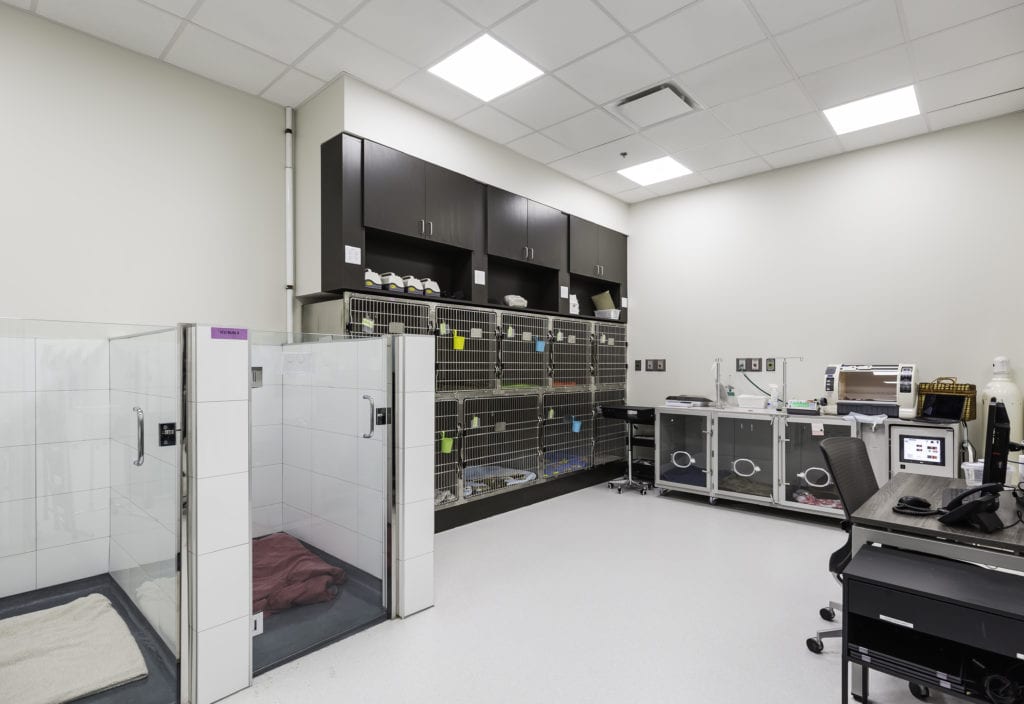
The specialty of small animal internal medicine service is centered around personalized, compassionate approach to diagnose, treat, and manage common illnesses, complex medical conditions, and long-term chronic illnesses affecting major body systems like the liver, kidneys, gastrointestinal tract, pancreas, lungs and upper airways, endocrine glands, immune system, blood and bone marrow and those systems affected by infectious diseases.
We take a close look at how all the systems in the body work together as a whole, because a problem in one area could cause complications in another, and how these can be prevented or minimized. The focus of our work revolves around providing you with all the options and coming up with a comprehensive treatment plan to help your pet have a better life.
Very often this includes using specialized laboratory testing, advanced diagnostic modalities like imaging (x-rays, abdominal ultrasound, CT scan, or fluoroscopy), procedures where a camera is used to look inside the body or organs (endoscopy), and/or getting samples from mass or within the body (aspiration, biopsy, or bone marrow etc.) where appropriate.
These state-of-the-art diagnostic tools and tests are done to diagnose your pet’s disease/problems and individually tailored to meet your pet’s needs. This may include the services of other specialists like surgeons, radiologists, dermatologists, cardiologist, neurologist,
oncologists, nutritionists, ophthalmologists, and criticalists to name a few, as some of these diseases may be advanced or uncommon where a simple solution might not exist.
Board certified veterinary internal medicine specialists receive an additional 4 years of specialized training (internship and residency) to be able to with your pets advanced care are certified by the American College of Veterinary Internal Medicine
To better understand why you are seeing a small animal internist, please see the following link.
https://www.vetspecialists.com/specialties/small-animal-internal-medicine
Internal Medicine appointments are made only on a referral basis, meaning that an examination here has been advised by your pet’s regular veterinarian, or the emergency veterinarian. Please have your veterinarian contact us via our online portal website (https://pulseveterinary.ca) with the referral information. After the referral is made, we will contact you to schedule your appointment. The Internal Medicine service cannot provide advice to clients over the phone for patients we have never seen for legal reasons, and it is often difficult to judge the correct approach to a situation without the opportunity to gather a complete history and directly examine
the patient. Currently the Internal Medicine service at Pulse Emergency and Veterinary
Specialists is available from 8:00am to 6:00pm Tuesday through Friday, and for consults through the emergency service, if necessary, after hours if deemed appropriate by the emergency service.
Our Team
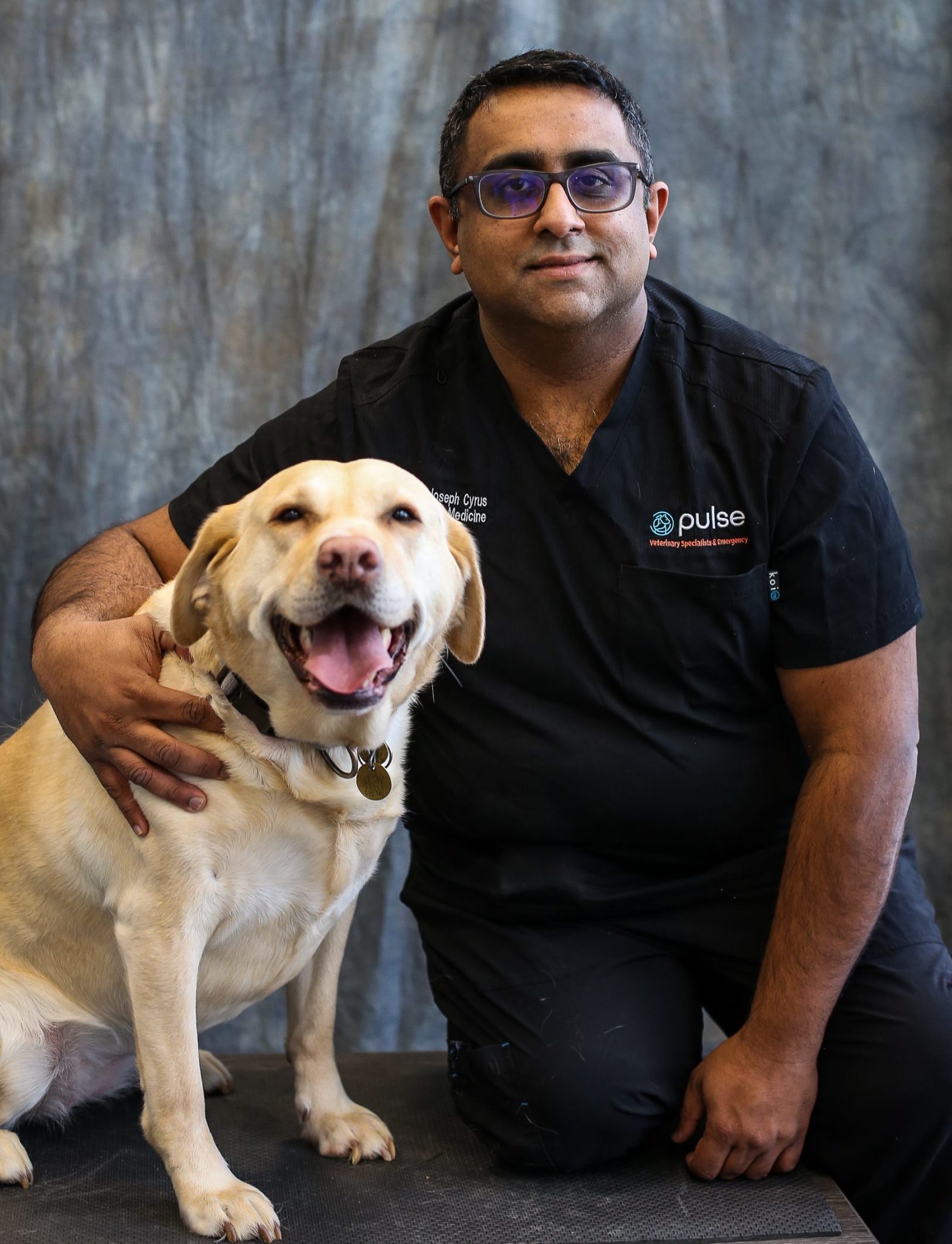
Dr. Joseph Cyrus comes from the southern state of India, Kerala where he received his veterinary degree in 2007. He subsequently did a master’s in veterinary medicine with a research focus on canine gastro-esophageal diseases from the neighboring state of Karnataka, India. After spending some time in speciality practice in India, he went to pursue his Ph.D. and specialty training (internship and residency) in Small Animal Internal Medicine at the College of Veterinary and Biomedical Science at Texas A&M University which he completed in 2018. He moved to Sherwood Park, from private speciality practice in Ottawa in Fall 2021.
Within the discipline of Internal Medicine, Dr. Cyrus has a special interest in small animal gastroenterology, particularly the exocrine pancreas, esophagus, and minimally invasive diagnostic procedures like endoscopy. Additionally, Dr. Cyrus has an interest in infectious diseases given his training in India and Texas, and affections of the renal and urinary system.
Outside of work, Dr. Cyrus enjoys spending time with his wife, his son, and his little dog (Zoe), his cat (Cassiy), and his most recent COVID addition, a yellow Labrador (Savannah).
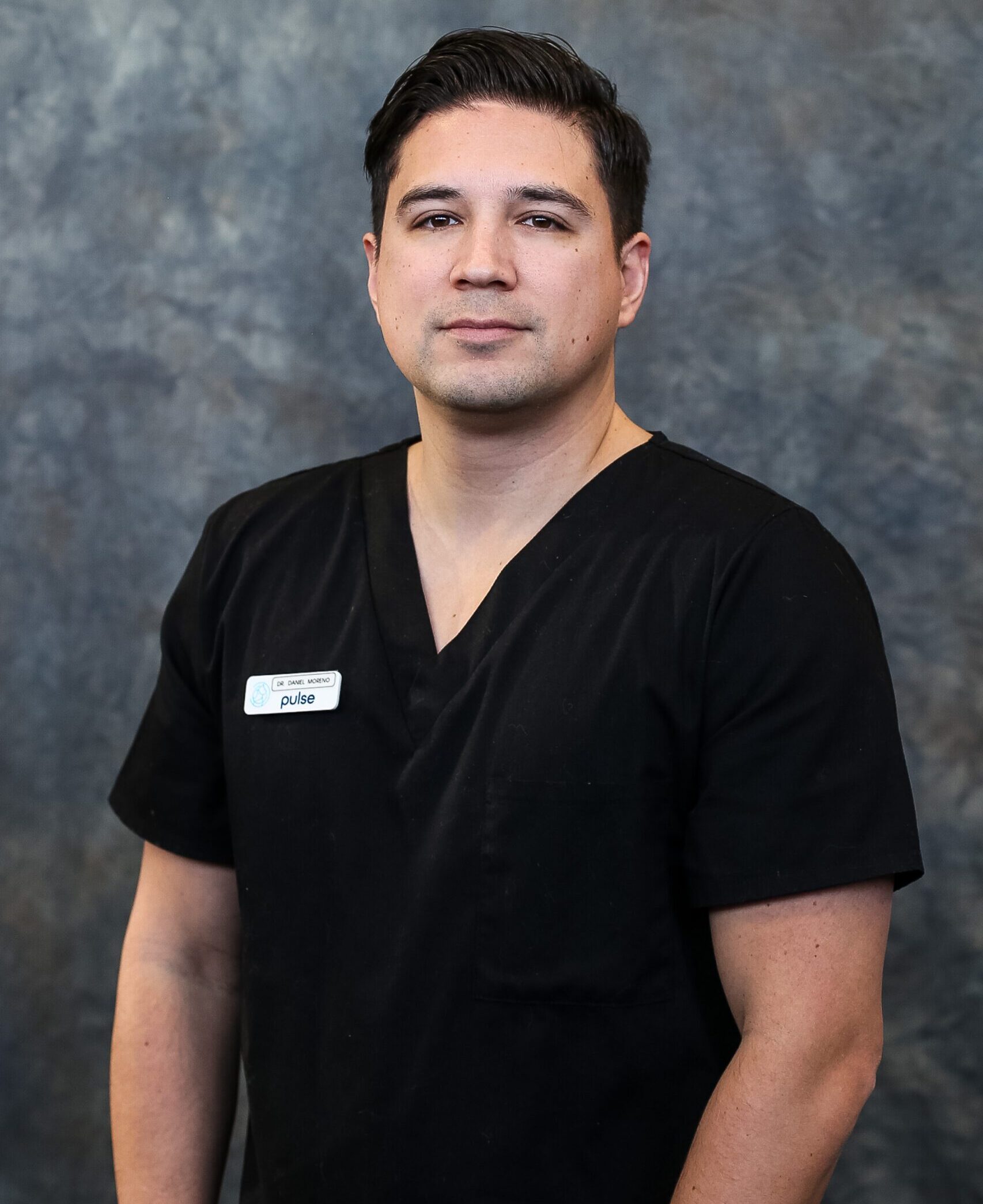
Dr Daniel Moreno is a veterinarian from Mexico. Born in Mexico City, he spent most of his life in Querétaro City, part of a central region in Mexico known for its mild weather and fertile plains. He went back to Mexico city where he completed veterinary school at Universidad Nacional Autónoma de México.
His commitment to advanced medicine led him to a rotating internship at the Ontario Veterinary College in 2018 followed by his specialty training in Small Animal Internal Medicine at the Western College of Veterinary Medicine which was completed in 2023.
While he appreciates the variety within internal medicine, he has developed an interest in endocrinology and hematology.
Outside of work Dr Moreno is a long-time football fan, enjoys traveling and spending time at home with his partner and their cat Mabel. In more recent years, he’s been honing his ice skating skills and learning about NHL to embrace his Canadian life.
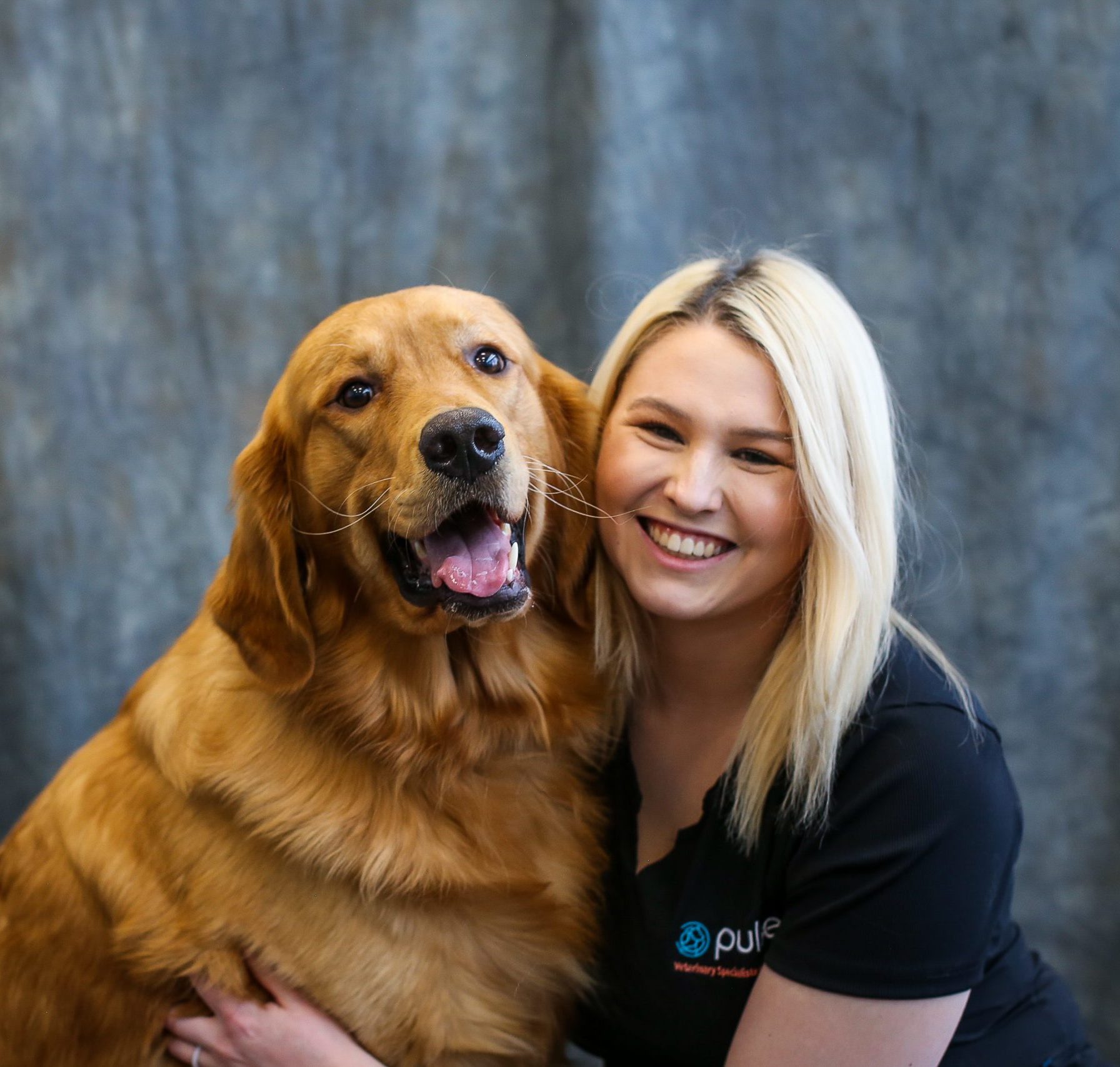
Bailey graduated with honours from Veterinary Medical Assistant at Lakeland College in 2019. Bailey is planning on returning to school for Animal Health Technology. In her spare time Bailey is usually hanging out with her fiancé and their “zoo” which includes 4 dogs and 2 cats.
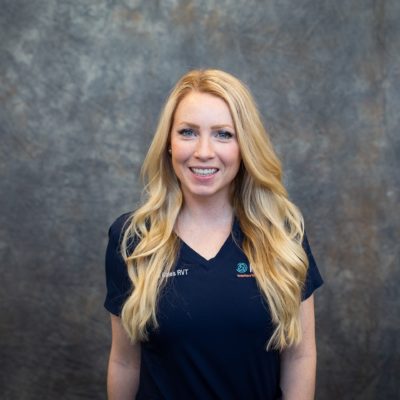
Chelsea graduated from the NAIT Animal Health Technology program in 2011 and more recently completed a Bachelor of Science from MacEwan University. She enjoys working with animals large and small and loves the variety found within her work. Her professional interests lie in emergency and critical care, laboratory procedures, and equine anesthesia. She can be found with her Quarter Horse mare ‘Poko,’ running, snowboarding, and spending time with family and friends in her free time.
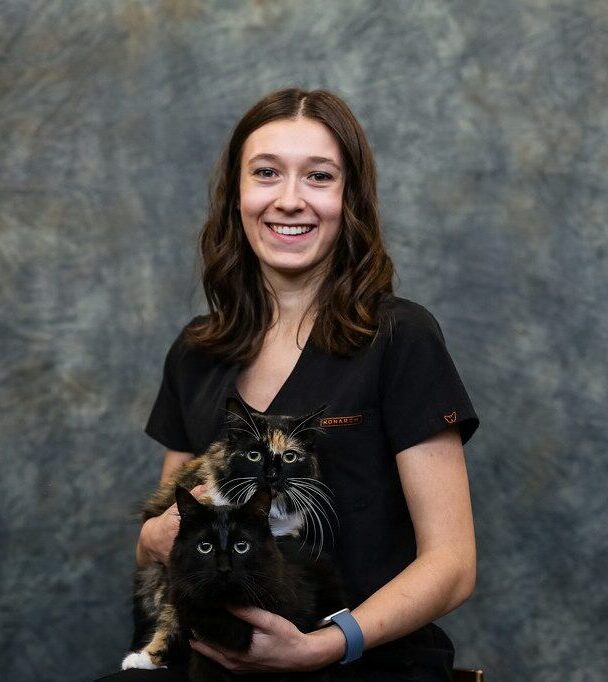
Chloe graduated from NAIT Animal Health Technology with honors in 2022, going straight into general practice. Chloe took an interest in emergencies, critical care, and anesthesia. Wanting to further her education and understanding of our furry companions, she joined the Internal Medicine Team in February of 2024. In her spare time, she can often be found reading or playing video games while snuggling her cats Ramsey and Iggy.

Bio to come

Bio to come

Bio to come

Laurel graduated from the animal health technology program from NAIT in 2018 but has been working and volunteering in the vet industry since 2015. She has always had a love for animals and enjoys working with them. Laurel is a proud dog mom to her mixed breed Kyrie, and they enjoy going on many long walks together.

Bio to come
Tools and Technology
The Internal Medicine service at Pulse Veterinary Specialists & Emergency currently can provide the following services for dogs and cats
This procedure involves using a syringe to collect synovial fluid from a joint capsule looking for infection or inflammation.
Lower airway endoscopy/ Bronchoscopy – a flexible camera (bronchoscope) is used to look inside air ways (trachea and the bronchi) and collect samples for cytology and culture.

This is how a normal trachea looks during bronchoscopy. The exam allows us to look for evidence of tracheal collapse.

This is how the bronchi look on the bronchoscopy. Samples of the mucous (yellow) would be collected for a pathologist to look at and also for a culture to identify micro-organisms that could be causing disease.
Esophagoscopy / Gastroscopy / Duodenoscopy or upper gastrointestinal endoscopy: Endoscopic examination of the upper digestive tract includes an evaluation of the esophagus, stomach and duodenum. These procedures are done to visualize the lining of the tract and collect biopsy samples without the need for surgery.
Sometimes, we use an endoscope to remove foreign objects, such as pennies, tennis balls, etc. from the stomach.

Upper gastrointestinal endoscopy is also used in conjunction with fluoroscopy for balloon dilatation of esophageal strictures, or polyp removals etc. We also do offer capsule endoscopy as an option in larger dogs and those who cannot undergo general anesthesia.
Colonoscopy or lower gastrointestinal endoscopy: A flexible endoscope is used to examine the lining of the colon and rectum and sometimes the terminal part of the small intestine the ileum in pets with frank blood in the stool, or issues with defecation.

Lower gastro-intestinal endoscopy in a dog showing the ileo-cecal junction which is the connection between the small and large intestines.
Cystoscopy: A rigid camera is used to examine the bladder (cystoscopy) and urethra (urethroscopy) are performed in female dogs with various urinary tract problems, like recurrent infections, tumors, urinary incontinence, or difficulty urinating. This serves as a method of a definitive diagnosis and for collecting biopsy samples.

Rhinoscopy: An endoscope is used to examine the front and back of the nose for cancer, inflammation, cancers etc. and collect biopsy samples. Sometimes this is used to treat nasal and fungal infections.

- (in conjunction with the surgical service): A small camera is introduced into the abdomen to look at the abdominal organs and collect biopsies from organs like the liver. Animals have a very small incision and usually go home the same day. This is considered the method of choice for investigating liver disease in dogs and cats.
Tubes are placed in the esophagus or the stomach, and rarely in the intestines to help with long-term feeding in dogs and cats who cannot or do not eat on their own. Sometimes this needs to be done with endoscopic assistance.
Samples and biopsies are collected from the bone marrow to help evaluate issues with the red and white blood cells.
options like urinary stents, managed of subcutaneous ureteral bypass (SUB) devices etc. in conjunction with surgery, radiology, and cardiology services.
and monitoring for dogs and cats who reside locally and require chemotherapy after virtual consultation with a board-certified oncologist. Currently there is no medical or radiation oncologist on staff at Pulse Veterinary Specialists & Emergency.
Currently, we do not offer the services primarily pertaining to canine and feline reproduction, nor dermatology (including the ears).
Before getting treatments and procedures, our in-depth consultation gives the opportunity to discuss the diagnosis, recommended procedures and their limitations, expected outcomes, and care needed. This is the time dedicated to answering your questions or addressing any concerns with our team.
Frequently Asked Questions
During your appointment your pet’s medical history will be reviewed and any previously performed laboratory and diagnostic imaging tests will be evaluated.
A complete physical examination will be performed by the Internal Medicine Specialist, and vitals will be collected. Further diagnostic and treatment recommendations will then be discussed along with a detailed cost estimate for any tests, diagnostics or treatments.
Before getting treatments and procedures, our in-depth consultation gives the opportunity to discuss the diagnosis, recommended procedures and their limitations, expected outcomes, and care needed. This is the time dedicated to answering your questions or addressing any concerns with our team.
Whenever possible, diagnostic procedures will be done on the same day as the as your pet’s initial appointment. These can include x-rays, abdominal ultrasounds, CT scans, fluoroscopic exams, and endoscopic examinations. The duration of these procedures can vary and can be a few hours as they very often do involve sedation or general anesthesia. On average, Internal Medicine evaluations can be time-consuming, so please prepare for a longer visit (typically 2-6 hours). For this reason, we may ask that you leave your pet with us so that we may complete our evaluation and provide you with a detailed treatment plan.
To make the consultation more efficient, please fill out the patient questionnaire at:
https://pulseveterinary.ca/about/pet-admission-forms/internal-medicine-questionnaire/
Please bring any videos, pictures or medication/ symptom logs or journals that you have with you.
Pets must be fasted prior to the appointment – no food after midnight, your pet may have a drink of water in the morning. (Unless your pet is a diabetic or less than 6 months old, in this case please contact the internal medicine service ahead to find out the recommendations for you). Being fasted does help us proceed with procedures that require sedation or general anesthesia the same day.
Your pet will only be able to go home once they have recovered from the anesthesia or sedation and we are happy with the recovery. Generally, most pets that undergo a procedure, unless there is a complication or a concern, can go home the on same day usually by the end of the day around 5 or 6pm.
Sometimes, procedures that require general anesthesia, special preparations (i.e., enemas for a colonoscopy) or some laboratory diagnosis will be scheduled for a later date or the next day.
If your pet is hospitalized, they will be kept comfortable in a kennel or run with bedding, water and a litter box (for cats). Dogs will be walked outside every 4 to 6 hours where possible. There is always a veterinarian and technicians in the hospital 24/7.
We realize that your time is valuable and will do everything possible to address your situation in a timely fashion, and to fit within your schedule where possible.
